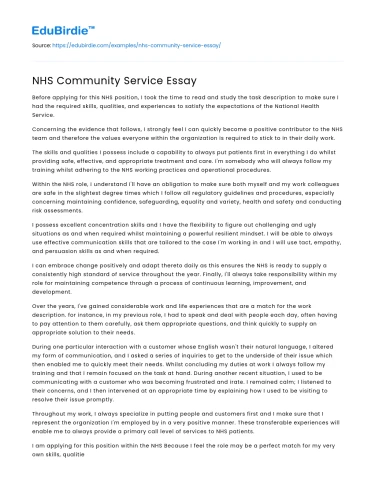Introduction
The National Health Service (NHS) in the United Kingdom has long been heralded as a cornerstone of the nation’s public health infrastructure. As the NHS faces increasing pressures due to demographic shifts and budget constraints, community services have emerged as a vital component in delivering holistic healthcare. NHS community service encompasses a diverse range of activities aimed at promoting health and well-being outside traditional hospital settings. This essay examines the significance of NHS community service, its impact on public health, and challenges it faces. By exploring real-life examples and scholarly perspectives, this analysis seeks to provide a comprehensive understanding of how community services enhance healthcare accessibility and quality.
The Impact of NHS Community Services on Public Health
NHS community services play an indispensable role in enhancing public health by providing accessible, patient-centered care. These services extend healthcare delivery beyond hospitals, reaching individuals in their homes and communities. This approach is particularly beneficial for managing chronic conditions, which, according to the World Health Organization, account for 60% of all deaths globally (WHO, 2021). Community services facilitate early intervention and continuous care, thus reducing hospital admissions and improving patient outcomes. For instance, the NHS's community nursing teams provide vital support for patients with complex needs, enabling them to manage their health conditions effectively at home.
Save your time!
We can take care of your essay
- Proper editing and formatting
- Free revision, title page, and bibliography
- Flexible prices and money-back guarantee
Moreover, NHS community services contribute significantly to preventive healthcare. Initiatives such as smoking cessation programs, dietary advice, and physical activity promotion are crucial in tackling lifestyle-related diseases. A study by Smith et al. (2020) found that community-based interventions led to a 20% reduction in smoking rates, demonstrating the efficacy of localized health strategies. By prioritizing prevention, community services help alleviate the long-term burden on the NHS, allowing it to allocate resources more efficiently.
However, the effectiveness of NHS community services is contingent upon adequate funding and staffing. The King's Fund (2019) highlights that financial constraints and workforce shortages are major barriers to expanding these services. Addressing these challenges is essential for maximizing the potential of community care in advancing public health objectives.
Challenges and Opportunities in NHS Community Service Delivery
While NHS community services offer numerous benefits, they also encounter substantial challenges that hinder their full potential. One significant issue is the integration of community services with other healthcare sectors. The fragmented nature of healthcare delivery often leads to disjointed patient care, where information sharing between hospitals, community providers, and general practitioners is inadequate. This lack of cohesion can result in inefficiencies and suboptimal patient experiences. As noted by Lang et al. (2022), seamless integration is critical to ensure continuity of care and enhance the effectiveness of community services.
Technology presents both an opportunity and a challenge for NHS community services. Telehealth and digital health solutions have the potential to revolutionize community care by improving access and enabling remote monitoring. The COVID-19 pandemic accelerated the adoption of these technologies, demonstrating their feasibility and benefits. However, the digital divide remains a concern, with disparities in access to technology disproportionately affecting vulnerable populations. Bridging this gap is essential to ensure equitable healthcare delivery through community services.
Furthermore, public awareness and engagement are pivotal in optimizing NHS community service use. Many individuals remain unaware of the services available to them, which can result in underutilization. Educating the public and fostering community involvement can enhance service uptake and ensure that healthcare resources are effectively utilized. Collaborative efforts between the NHS, local authorities, and community organizations can facilitate this process, creating a more informed and health-conscious society.
Conclusion
NHS community services are integral to the future of public health in the United Kingdom, offering a model of care that emphasizes accessibility, prevention, and patient-centeredness. Despite facing challenges such as funding limitations and integration issues, community services have demonstrated their capacity to improve health outcomes and reduce pressure on hospital-based services. By addressing these obstacles and leveraging opportunities like technological advancements and public engagement, the NHS can further enhance the efficacy of its community services. As healthcare demands continue to evolve, the role of community services will be increasingly crucial in achieving sustainable and equitable health outcomes for all.
In conclusion, the NHS community service framework represents a critical evolution in healthcare delivery, aligning with contemporary needs and expectations. By fostering collaboration, innovation, and inclusivity, community services can continue to contribute substantially to the well-being of the population. As this essay has explored, the potential of NHS community services is vast, and with strategic investments and policy support, they can play a pivotal role in shaping the future of healthcare.






 Stuck on your essay?
Stuck on your essay?

